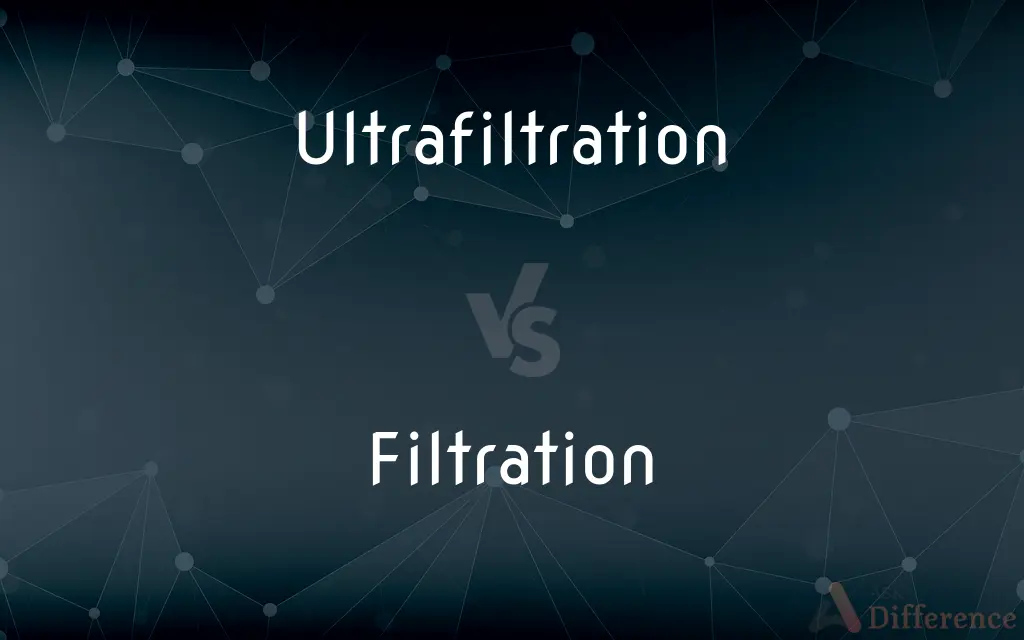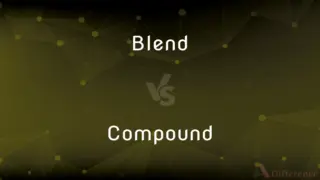Ultrafiltration vs. Filtration — What's the Difference?
Ultrafiltration specifically targets the separation of very fine particles and dissolved molecules through a semipermeable membrane, whereas filtration broadly encompasses any process that separates solids from liquids or gases using a filter medium.

Difference Between Ultrafiltration and Filtration
Table of Contents
ADVERTISEMENT
Key Differences
Ultrafiltration is a specialized form of filtration that uses semipermeable membranes to separate particles and molecules based on size, typically in the range of 0.01 to 0.1 micrometers. This process is particularly effective for removing bacteria, viruses, and high molecular weight solutes from water and other liquids. On the other hand, filtration is a more general term that refers to the process of separating solid particles from fluids (liquids or gases) or from other solids by passing them through a medium that only allows the fluid to pass through.
Ultrafiltration membranes have a pore size that selectively allows water and low molecular weight solutes to pass through while retaining higher molecular weight substances. This makes ultrafiltration particularly useful in applications requiring the concentration, clarification, or fractionation of macromolecules. Conversely, filtration mediums can range from coarse sand in sand filters to fine membranes in membrane filtration, and their selection depends on the desired purity level and the nature of the impurities to be removed.
The driving force behind ultrafiltration is usually pressure or concentration gradients, which push the solvent and small molecules through the membrane while retaining larger particles and molecules. Filtration, however, can be driven by gravity, pressure, or vacuum, depending on the specific method and application, highlighting the flexibility of filtration processes.
Ultrafiltration systems are often more complex and expensive than conventional filtration systems due to the need for specialized membranes and equipment to maintain pressure and flow rates. Filtration systems can range from simple, low-cost setups like sand filters to more sophisticated and expensive systems like high-efficiency particulate air (HEPA) filters, reflecting the wide range of applications and required levels of purity.
Comparison Chart
Purpose
Separates fine particles and molecules based on size
Separates solids from fluids or from other solids
ADVERTISEMENT
Membrane/Filter Medium
Semipermeable membranes
Varied mediums (sand, cloth, paper, etc.)
Particle Size
0.01 to 0.1 micrometers
Varies widely
Applications
Water treatment, food & beverage industry, pharmaceuticals
Water treatment, air purification, chemical processing, etc.
Driving Force
Pressure or concentration gradients
Gravity, pressure, vacuum, or centrifugal force
Compare with Definitions
Ultrafiltration
A process of separating very fine particles and dissolved molecules using a semipermeable membrane.
Ultrafiltration is used in water treatment plants to remove bacteria.
Filtration
A method for separating solids from liquids or gases using a filter medium.
Filtration is a common step in the production of potable water.
Ultrafiltration
Utilizes pressure or concentration gradients to drive separation.
Ultrafiltration systems rely on high pressure to push water through membranes.
Filtration
Can vary widely based on the complexity and scale of the system.
Simple mechanical filters are relatively inexpensive and easy to maintain.
Ultrafiltration
Common in water purification, pharmaceuticals, and the food industry.
In the dairy industry, ultrafiltration is employed to concentrate and purify milk proteins.
Filtration
Can operate under gravity, pressure, vacuum, or centrifugal forces.
Vacuum filtration is often used in laboratories to isolate precipitates.
Ultrafiltration
Features pore sizes typically ranging from 0.01 to 0.1 micrometers.
The ultrafiltration membrane's pore size allows it to effectively trap viruses.
Filtration
Versatile in use, including air purification, liquid clarification, and industrial processing.
HEPA filters are essential in maintaining clean air in hospital settings.
Ultrafiltration
Generally higher due to the need for specialized membranes and equipment.
The initial investment in ultrafiltration technology can be substantial for small facilities.
Filtration
Ranges from coarse materials like sand to fine membranes.
Sand filtration is a simple and effective method for treating swimming pool water.
Ultrafiltration
Ultrafiltration (UF) is a variety of membrane filtration in which forces like pressure or concentration gradients lead to a separation through a semipermeable membrane. Suspended solids and solutes of high molecular weight are retained in the so-called retentate, while water and low molecular weight solutes pass through the membrane in the permeate (filtrate).
Filtration
The act or process of filtering; the mechanical separation of a liquid from the undissolved particles floating in it.
Ultrafiltration
The filtration of a solution or colloidal substance through a semipermeable medium that allows only the passage of small molecules.
Filtration
Filtration is a physical or chemical separation process that separates solid matter and fluid from a mixture using a filter medium that has a complex structure through which only the fluid can pass. Solid particles that cannot pass through the filter medium are described as oversize and the fluid that passes through is called the filtrate.
Ultrafiltration
Filtration through a semipermeable membrane that only allows small molecules through.
Filtration
The action or process of filtering something
Small particles are difficult to remove without filtration
Filtration
The act or process of filtering.
Filtration
A totally ordered collection of subsets.
Filtration
The act or process of filtering; the mechanical separation of a liquid from the undissolved particles floating in it.
Filtration
The process whereby fluids pass through a filter or a filtering medium
Filtration
The act of changing a fluid by passing it through a filter
Common Curiosities
What drives the separation process in ultrafiltration?
The separation in ultrafiltration is usually driven by pressure or concentration gradients across the membrane.
What is ultrafiltration?
Ultrafiltration is a process that separates very fine particles and dissolved molecules using a semipermeable membrane, typically for water treatment and in the food and pharmaceutical industries.
Can filtration be used for air purification?
Yes, filtration processes, including HEPA filters, are widely used for air purification in various settings, including homes and healthcare facilities.
What are the typical applications of ultrafiltration?
Ultrafiltration is commonly used in water treatment, dairy industry for protein concentration, and in pharmaceuticals for purifying substances.
What is the significance of pore size in ultrafiltration membranes?
The pore size determines the size of particles and molecules that can be retained, making it crucial for specific applications like removing bacteria and viruses.
Is ultrafiltration effective against viruses?
Yes, ultrafiltration can effectively remove viruses from water due to its small pore size.
How does filtration differ from ultrafiltration?
Filtration is a broader term that includes any process for separating solids from fluids or from other solids, using a variety of filter mediums, unlike ultrafiltration's specific use of semipermeable membranes.
Can ultrafiltration be used for desalination?
While ultrafiltration is effective for removing certain solutes and contaminants, desalination typically requires reverse osmosis, which can remove salt ions.
How do cost considerations compare between ultrafiltration and traditional filtration?
Ultrafiltration systems tend to be more expensive due to the specialized membranes and equipment needed, whereas traditional filtration can range from low-cost to high-end systems.
What kinds of materials can be filtered using conventional filtration methods?
Conventional filtration can separate a wide range of materials, from particulate matter in air to suspended solids in water.
What types of filters are used in conventional filtration?
Conventional filtration can use sand, cloth, paper, and even activated carbon as filter mediums.
Can filtration remove chemical contaminants?
Certain filtration methods, like activated carbon filters, are effective in removing chemical contaminants from water.
What maintenance does an ultrafiltration system require?
Ultrafiltration systems often require regular cleaning and periodic membrane replacement to maintain efficiency.
Is pressure always required for filtration processes?
No, some filtration processes, like gravity sand filters, operate without external pressure, relying on gravity alone.
Share Your Discovery

Previous Comparison
Blend vs. Compound
Next Comparison
Lair vs. Layer














































